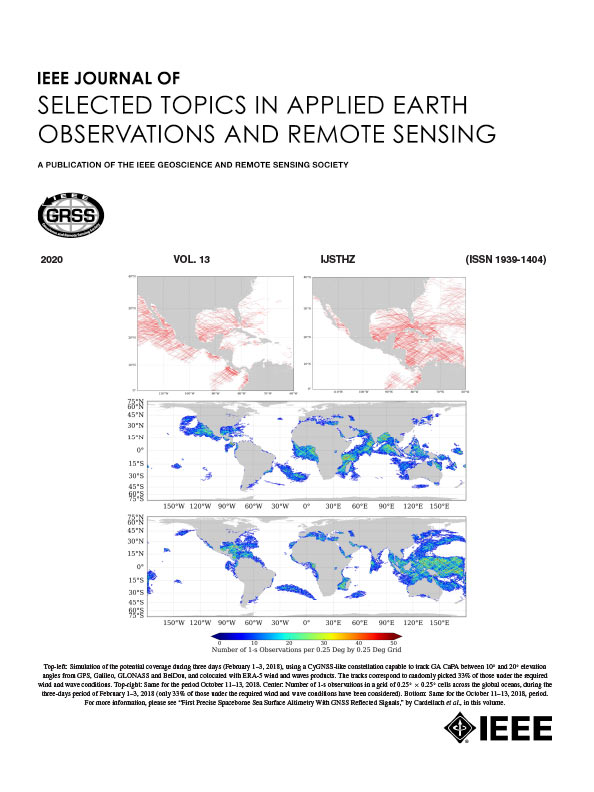Spectral-Enhanced Sparse Transformer Network for Hyperspectral Super-Resolution Reconstruction
IF 4.7
2区 地球科学
Q1 ENGINEERING, ELECTRICAL & ELECTRONIC
IEEE Journal of Selected Topics in Applied Earth Observations and Remote Sensing
Pub Date : 2024-09-10
DOI:10.1109/JSTARS.2024.3457814
引用次数: 0
Abstract
Hyperspectral image (HSI) has garnered increasing attention due to its capacity for capturing extensive spectral information. However, the acquisition of high spatial resolution HSIs is often restricted by current imaging hardware limitations. A cost-effective approach to enhance spatial resolution involves fusing HSIs with high spatial resolution multispectral images collected from the same scene. Traditional convolutional neural network-based models, although gained prominence in HSI super-resolution reconstruction, are typically limited by their small receptive field of the convolutional kernel, primarily emphasizing local information while neglecting nonlocal characteristics of the image. In light of these limitations, this article proposes a novel spectral-enhanced sparse transformer (SEST) network for HSI super-resolution reconstruction. Specifically, the proposed SEST employs a sparse transformer to capture nonlocal spatial similarities efficiently, along with a spectral enhancement module to learn and exploit spectral low-rank characteristics. Integrated within a multiwindow residual block, the abovementioned two components collaboratively extract and combine distinct fine-grained features through a weighted linear fusion process, facilitating the integration of spatial and spectral information to optimize the reconstruction result. Experimental results validate the superior performance of the proposed SEST model against current state-of-the-art methods in both visual and quantitative metrics, thus confirming the effectiveness of the proposed approach.用于高光谱超分辨率重建的光谱增强稀疏变换器网络
高光谱图像(HSI)因其能够捕捉大量光谱信息而受到越来越多的关注。然而,高空间分辨率 HSI 的获取往往受到当前成像硬件的限制。提高空间分辨率的一种经济有效的方法是将 HSI 与从同一场景采集的高空间分辨率多光谱图像进行融合。传统的基于卷积神经网络的模型虽然在 HSI 超分辨率重建中获得了突出的地位,但通常受限于其卷积核的小接受场,主要强调局部信息,而忽略了图像的非局部特征。鉴于这些局限性,本文提出了一种新颖的光谱增强稀疏变换器(SEST)网络,用于 HSI 超分辨率重建。具体来说,所提出的 SEST 采用稀疏变换器来有效捕捉非局部空间相似性,同时采用光谱增强模块来学习和利用光谱低秩特征。上述两个组件集成在多窗口残差块中,通过加权线性融合过程协同提取和组合不同的细粒度特征,促进空间和光谱信息的整合,从而优化重建结果。实验结果验证了所提出的 SEST 模型在视觉和定量指标上都优于目前最先进的方法,从而证实了所提出方法的有效性。
本文章由计算机程序翻译,如有差异,请以英文原文为准。
求助全文
约1分钟内获得全文
求助全文
来源期刊
CiteScore
9.30
自引率
10.90%
发文量
563
审稿时长
4.7 months
期刊介绍:
The IEEE Journal of Selected Topics in Applied Earth Observations and Remote Sensing addresses the growing field of applications in Earth observations and remote sensing, and also provides a venue for the rapidly expanding special issues that are being sponsored by the IEEE Geosciences and Remote Sensing Society. The journal draws upon the experience of the highly successful “IEEE Transactions on Geoscience and Remote Sensing” and provide a complementary medium for the wide range of topics in applied earth observations. The ‘Applications’ areas encompasses the societal benefit areas of the Global Earth Observations Systems of Systems (GEOSS) program. Through deliberations over two years, ministers from 50 countries agreed to identify nine areas where Earth observation could positively impact the quality of life and health of their respective countries. Some of these are areas not traditionally addressed in the IEEE context. These include biodiversity, health and climate. Yet it is the skill sets of IEEE members, in areas such as observations, communications, computers, signal processing, standards and ocean engineering, that form the technical underpinnings of GEOSS. Thus, the Journal attracts a broad range of interests that serves both present members in new ways and expands the IEEE visibility into new areas.

 求助内容:
求助内容: 应助结果提醒方式:
应助结果提醒方式:


